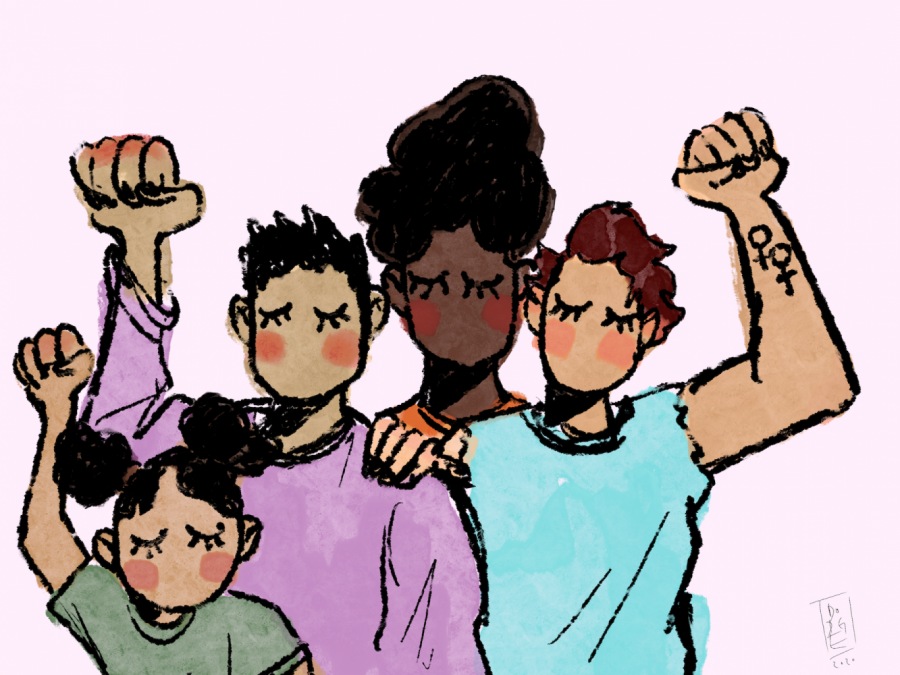It’s March, which means that National Women’s History Month is upon us. When one thinks about women’s history, Susan B. Anthony’s suffragette movement is one of the most common things to come to mind. However, this initial thought comes because of the tainted history we have been taught — in reality, Susan B. Anthony’s revered movement excluded non-white women, so it goes without saying that queer and trans women were excluded as well.
This exclusion is not uncommon and still happens today — often, movements such as #MeToo shine a spotlight on white, cisgendered women. Excluding the experiences of marginalized women perpetuates the issues they face. In light of this, what do diverse, woman-identifying students on campus think of the celebration of womanhood today?
To Steinhardt first-year Gigi Sigal, being a woman means having an omnipresent sense of community.
“There is a certain element of sisterhood that I’m really thankful for,” Sigal said. “And with that, I think as a woman, it means that we have a responsibility to hold up all other women — and all other humans — but especially women.”
Liberal Studies first-year Trinity Casimir speaks from the perspective of a Caribbean-American woman, and how the intersection of her identities affect her experience.
“Just because I’m a woman doesn’t mean I share experiences with all women,” Casimir said. “I’m also black. I’m also of Caribbean descent. I’m also an American […] I have a unique way of viewing the world and it’s important that I share that with people and use it to uplift other women.”
Though every woman may face different types of religious, racial or class discrimination, the underlying love and respect that brings women together is strong. Sigal emphasizes the importance of allyship across all lines.
“We’re all in the same boat here — regardless of who you are, what you look like, what you know, what your abilities are,” Sigal said. “I think it’s really important to — and we share this responsibility and strength — support each other.”
When looking for women in history who are exceptional symbols of this solidarity, Casimir relates and respects Nina Simone, who shared her love for piano and social justice.
“[Simone] so creatively and beautifully turned her pain into something that people could view and understand,” Casimir said. “The way that she communicated and interacted with the world is really inspiring […] she was controversial and brave.”
Having a means for the expression of pain and love is not only something that Nina Simone mastered, but according to Sigal, the U.S. Women’s National Soccer Team is doing currently. With their historic win in 2019, the team faced backlash for every expression of physical exhaustion, anger or happiness.
“They’re fighting not just for themselves and for equal pay in a field that they are dominating with,” Sigal said. “They’re also fighting for the rights of so many others by doing so. And I think it’s really important that they’re doing this in a way that’s just so beneficial to all of us as well as doing it on a public platform.”
Fighting for justice is a common thread when it comes to venerated female figures; CAS first-year Amina Bejja looks up to Malala Yousafzai as the youngest Nobel Peace Prize laureate and activist for women’s education worldwide.
“She risked her life speaking up and voicing her opinion against oppressors who did not want her to […] Despite the hardships, despite the obstacles, despite her getting shot in the face, that did not stop her from voicing her opinion and being a strong leader as a woman,” Bejja said.
However, activism is not always necessary to have a large impact on women and girls around the world. Often, the most important female figures in our lives are the mothers, aunts and grandmothers that were able to make an impact. To Casimir, an important lesson her mother taught her was to be authentically herself, despite the confinements and stereotypes surrounding her.
“I was embarrassed about the fact that I had emotions,” Casimir said. “And I think it was very helpful for my mom to tell me that it is okay to feel things deeply and to be emotional […] We don’t want to show that side of ourselves. We don’t want to be hormonal or irrational. But to be emotional isn’t to be irrational necessarily. I think that my sensitivity makes me empathetic. It makes me caring. It makes me passionate, and it motivates what I do.”
Email Nya Etienne at [email protected].


























































































































































